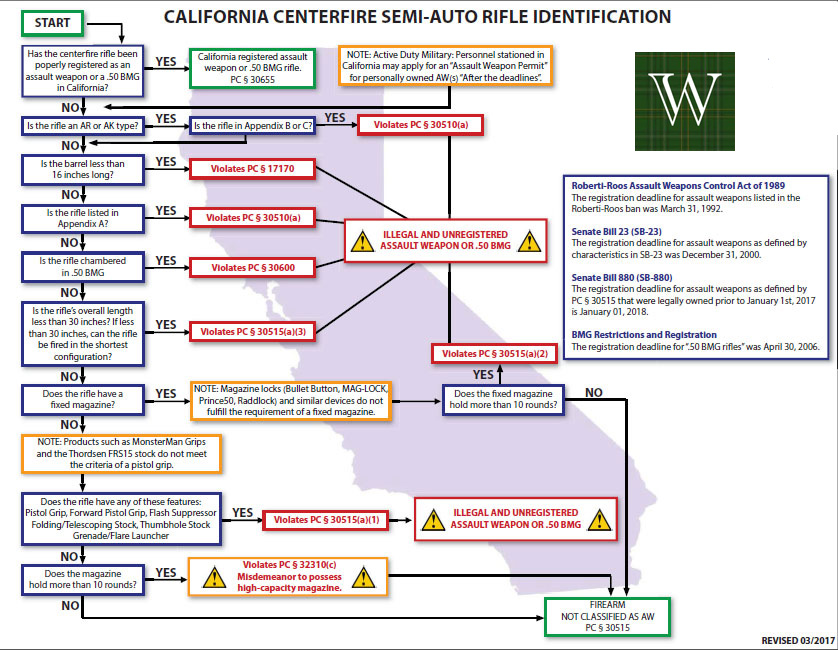The Second Amendment of Bill of Rights in the United States Constitution affords us the right to keep and bear arms.
Restore Gun / Firearm Rights
Restoring Your Constitution Right to Firearms (Guns)
Although you may believe that you are prohibited from owning or possessing a firearm, there are exceptions, even for a felony conviction. It may be difficult to restore your gun rights, but in many cases it's not impossible. Contact us for a free consultation to determine if you qualify to restore your 2nd Amendment Rights to a firearm.
Gun Rights Pursuant to the Constitution
"A well regulated Militia, being necessary to the security of a free State, the right of the people to keep and bear Arms, shall not be infringed."
The Constitution of California does not contain a provision explicitly guaranteeing an individual right to keep and bear arms.

2nd Amendment Attorney
Michael Devereux is a highly respected gun rights attorney in Los Angeles when it comes to restoring your firearm rights. His vast experience, zealous advocacy for his clients and extensive knowledge of many areas of gun rights, including the 2nd Amendment make Mr. Devereux an elite 2nd Amendment attorney if you are seeking to retore your rights. Mr. Devereux started his own firm in 2004 after working for the Cochran Firm, and assisting with the Robert Blake and Michael Jackson defense teams under Thomas Mesereau. As the sole proprietor of Wexford Law, Mr. Devereux has been successfully restored his clients gun rights for close to 20 years in respect to the 2nd Amendment and gun / firearm rights. Former clients, their family and friends repeatedly return to Wexford Law for help in restoring gun rights. Mr. Devereux loves taking on the federal government and the State of California for your right to possess firearms.
FAQ Constitution Rights to Guns

An expungement does not restore firearm rights. It's been that way for many, many years. It fact the law is clear on that issue. California Penal Code Section 1203.4(a)(2) is the law that provides for an expungement. The law clearly states that "Dismissal of an accusation or information pursuant to this section does not permit a person to own, possess, or have in his or her custody or control any firearm...."
There could be several reasons for the issue. The first issue may be that you plead to a felony and then later tried to reduce it to a misdemeanor but the felony wasn't eligible to be reduced to a misdemeanor. The second issue may be that under California Penal Code 29805 PC, there are about 40 specific misdemeanor convictions that carry a ten-year firearms ban. However, federal law may keep you from a firearm for life even for a misdemeanor.
Maybe. California law prohibits you from owning or possessing a firearm for ten years. Federal law, under certain circumstances, has a lifetime firearm ban. Contact a Wexford Law attorney to discuss further.
There are many exceptions, even for felony convictions:
- - For example any person employed as a peace officer or whose employment or livelihood is dependent on the ability to legally possess a firearm, who is subject to the prohibition because of certain convictions, may petition the court only once for relief from this prohibition;
- - In addition, there are constitutional issues that may assist in retoring your rights such mistake of fact;
- - ineffective assistance of counsel (i.e. failure to investigate and advise, failure to pursue an alternative solution, failure to investigate and present mitigating factors, etc);
- - Further, there may be a possibility of reducing the felony to a misdemeanor;
- - There are many other exceptions.
Contact Wexford Law to discuss further.<
Michael Devereux, An Elite Attorney in Restoring Gun Rights
Millions of veterans have risked their lives to protect the 2nd Amendment. Revolutionay war veterans thought that gun rights were important enough that they were the 2nd Amendment to the Bill of Rights, right behind freedom of speech and freedom of religion.
The primary author of the United States Bill of Rights, James Madison, considered firearm rights — including a right to keep and bear arms — to be fundamental. In 1788, he wrote: "The political truths declared in that solemn manner acquire by degrees the character of fundamental maxims of free Government, and as they become incorporated with the national sentiment, counteract the impulses of interest and passion."
The view that gun ownership is a fundamental right was affirmed by the U.S. Supreme Court in District of Columbia v. Heller (2008). The Court stated: "By the time of the founding, the right to have arms had become fundamental for English subjects." The Court observed that the English Bill of Rights of 1689 had listed a right to arms as one of the fundamental rights of Englishmen.
When the U.S. Supreme Court interpreted the Fourteenth Amendment in McDonald v. City of Chicago (2010), it looked to the year 1868, when the amendment was ratified and said that most states had provisions in their constitutions explicitly protecting this right. The Court concluded: "It is clear that the Framers and ratifiers of the Fourteenth Amendment counted the right to keep and bear arms among those fundamental rights necessary to our system of ordered liberty."
Prohibition & Firearms Act
The first major federal firearms law passed in the 20th century was the National Firearms Act (NFA) of 1934. It was passed after Prohibition-era gangsterism peaked with the Saint Valentine's Day massacre of 1929. The era was famous for criminal use of firearms such as the Thompson submachine gun (Tommy gun) and sawed-off shotgun. Under the NFA, machine guns, short-barreled rifles and shotguns, and other weapons fall under the regulation and jurisdiction of the Bureau of Alcohol, Tobacco and Firearms (ATF).
Gun Control Act of 1968
The Gun Control Act of 1968 (GCA) was passed after the assassinations of President John F. Kennedy, Senator Robert Kennedy, and African-American activists Malcolm X and Martin Luther King, Jr. in the 1960s. The GCA focuses on regulating interstate commerce in firearms by generally prohibiting interstate firearms transfers except among licensed manufacturers, dealers, and importers. It also prohibits selling firearms to certain categories of individuals defined as "prohibited persons."
NICS Background Check
Since the passage of the Brady Handgun Violence Prevention Act of 1993, those who purchase firearms from licensed dealers in the United States must submit to a background check to determine if they are eligible to buy and possess a gun.
Licensed dealers must check each person who tries to buy a firearm through the FBI's National Instant Criminal Background Check System (NICS).
If the buyer qualifies, the dealer then requests a NICS check. NICS has three business days to approve or deny the sale. If the three days pass without a NICS determination, then the dealer can process the sale of the firearm (depending on local laws) or wait until NICS responds.
Slightly more than 1 percent of firearm transfers are denied by the NICS system.
Prohibited Criteria for Denial
The FBI publishes category-by-category breakdowns of how many gun sales it has denied under each of criteria. The list below show which prohibitions have blocked the most sales since NICS’s launch in November 1998.
If you have been denied or prohibited from purchasing a firearm, contact Wexford Law to discuss your gun rights. Free consultation.
1) Convicted of a crime punishable by more than one year or a misdemeanor punishable by more than two years.
Prospective buyers who want to purchase firearms must first provide the dealer with photo identification and a completed Firearms Transaction Record, or Form 4473. If the buyer answers yes to any of the questions on Form 4473, the dealer is required to deny the sale. It is a felony, punishable by up to five years in prison, to lie when completing the form.
2) Fugitive from Justice
A surprising number of people on the run from open arrest warrants walk into gun stores and try to buy firearms. When a purchaser is flagged as a fugitive, the FBI contacts the agency that issued the warrant to see if it’s still open and if the person has fled the state that issued the warrant. The examiner then alerts those authorities to the address of the Federal Firearms License holder that processed the check. In a few states with proactive policies, this sometimes results in an arrest in the gun store.
3) Convicted of Misdemeanor Domestic Violence
This red flag is strictly limited to misdemeanor convictions for abusing a spouse, live-in significant other, or child. A misdemeanor for violence against a sibling, parent, or an intimate partner who neither shares a child with nor lives with the person charged would not disqualify a purchaser — an aspect of the law sometimes referred to as “the boyfriend loophole.”
4) Unlawful User/Addicted to a Controlled Substance
Despite the fact that the National Institutes of Health estimates almost 25 million Americans used an illicit drug in the past month, the NICS Indices – the FBI database set aside for records of persons banned from guns – only has about 24,000 active drug-related records.
5) State Prohibitor
Many states have their own additional categories of prohibited purchasers that they report to the NICS. California for example,prohibit people convicted of offenses like misdemeanor assault that fall short of the federal requirements for denying a gun sale. Many times a modification of the conviction may be helpful.
6) Restraining Order Prohibitor
Restraining orders remain in NICS as long they are in effect. Sometimes the orders are permanent, but they can also be temporary, in contrast to convictions for crimes which are permanently prohibiting. Gun restrictions on those who have received such orders are believed to be among the most effective reducers of domestic homicide.
7) Under Indictment
Anyone who is under indictment for a crime carrying a potential year-long jail sentence — but not yet convicted — is barred from owning a gun while the case is being resolved. These are among the most difficult categories of prohibitions to confirm, since the disposition of charges may not be automatically submitteds to the databases that a gun background check scans.
8) Adjudicated Mental Health
Disqualifying mental health records form the second-largest body of records held by the NICS Indices. Simply receiving a diagnosis of a severe mental illness like schizophrenia is not enough to bar an American from gun ownership — a judge must legally declare a person mentally unfit to own a gun or involuntarily commit him or her to a mental institution. A simple 5150 hold is not enough to disqualify an individual from gun ownership.
9) Illegal/Unlawful Alien
The NICS Indices hold more records on illegal/unlawful aliens than any other type of prohibited purchaser — more than 7 million. But few unlawful immigrants try to buy guns from licensed dealers and wind up raising flags, especially compared to would-be buyers with criminal pasts.
10) Federally Denied Persons File
This is a catch-all category that includes various people whom the FBI deems ineligible to possess a firearm even though the relevant state records may not be entered into NICS or the National Crime Information Center. Also included in the Federally Denied Persons File are people who may not possess guns as a result of a deferred judgement.
11) Dishonorable Discharge
Violations of military conduct are handled by the armed services’ internal judicial system, which does not distinguish between the felonies and misdemeanors that become the basis for gun bans for civilians. To account for the military personnel kicked out of the services under the most serious circumstances — a dishonorable discharge — the gun background check system includes these records as their own category.
12) Renounced U.S. Citizenship
According to the State Department, anyone who formally renounces American citizenship also “must renounce all the rights and privileges associated with such citizenships.” That includes Second Amendment rights. Denials under this category are exceedingly rare.
New California Residents
Pursuant to Penal Code sections 17000 and 27560, any person who moves into California with a firearm is considered a "Personal Firearm Importer" and is required by California law to do one of the following within 60 days:
- • Complete and submit a New Resident Report of Firearm Ownership (BOF 4010A) along with $19.00 to the California Department of Justice, Bureau of Firearms;
-
• Sell or transfer the firearm to a California licensed firearms dealer or to another individual using a California licensed firearms dealer to conduct the transaction; or
- • Sell or transfer the firearm to a California police or sheriff's department. Persons choosing this option should contact the law enforcement agency for instructions prior to transporting the firearm to the agency.
TRANSPORTING HANDGUNS Any person transporting handguns into California is required under California law to transport those handguns unloaded and in a locked container other than the glove compartment or utility compartment of a vehicle.
ASSAULT WEAPONS Please be advised that it is generally unlawful to bring assault weapons into California. Additionally, machine guns and ammunition feeding devices with the capacity to accept greater than 10 rounds may not be transported into California.
5150 Hold versus a 5150 Admission
When an individual is placed on a 72 hour hold on grounds of danger to self or others (but not grounds of grave disability) and admitted to a treatment facility, he or she is hereafter prohibited from purchasing or possessing firearms for a period of five-years. California case law has established that the hold does not have meaning in terms of firearm possession unless the patient is admitted.
Pursuant to 18 U.S.C. § 922(d), it is unlawful for any person to sell or otherwise dispose of any firearm or ammunition to any person knowing or having reasonable cause to believe that such person “has been adjudicated as a mental defective or has been committed to any mental institution.” As interpreted by the U.S. Bureau of Alcohol, Tobacco, and Firearms, involuntary detention in a psychiatric facility “for observation" (as in California’s 72-hour hold) is specifically excluded so if one is not admitted to the hospital then the federal law does not apply.
California firearm laws relating to mental health treatment (5150, et al) are located in Welfare and Institutions Code, sections 8100-8108. The subsection of the law with the broadest application is 8103(f)(1). The Journal of Psychiatric Practices summarizes this provision succinctly:
Added in 1990, this provision provides that, when an individual is placed on a 72-hour hold on grounds of danger to self or others (but not grounds of grave disability) and admitted to a treatment facility, he or she is thereafter prohibited from purchasing or possessing firearms for a period of 5-years. As described in Welfare and Institutions Code section 5150 et seq., the process of involuntary inpatient psychiatric treatment in California begins with a 72-hour hold. The hold is initiated when, based on a face-to-face evaluation, an authorized evaluator (a psychiatrist, a social worker, or a peace officer) determines that there is probable cause to believe that, as a result of a mental disorder, the individual poses a danger to self or others or is gravely disabled. Once initiated, the 72-hour hold is not subject to any process of appeal or review, except when the hold has been placed “in the field” (e.g. by a peace officer). In the latter case, the receiving clinician at the treatment facility decides whether to continue the hold and admit the patient, or terminate the hold and release the patient (sections 5151 and 5152). California case law has established that the hold does not have meaning in terms of firearm possession unless the patient is admitted.
(Simpson, Joseph R. (2007). Issues Related to Possession of Firearms by Individuals with Mental Illness: An Overview Using California as an Example. Law and Psychiatry, Vol. 13 (No.2), pp. 1-2.)
Ca. Welf. & Inst. Code § 8100.
A person shall not have in his or her possession or under his or her custody or control, or purchase or receive, or attempt to purchase or receive, any firearms whatsoever or any other deadly weapon if … he or she has been admitted to a facility and is receiving inpatient treatment [for a mental disorder], is a danger to self or others, even though the patient has consented to that treatment.
Ca. Welf. & Inst. Code § 8103.
No person who has been adjudicated by a court of any state to be a danger to others as a result of a mental disorder or mental illness shall purchase or receive, or attempt to purchase or receive, or have in his or her possession, custody, or control a firearm or any other deadly weapon unless there has been issued to the person a certificate by the court of adjudication upon release from treatment or at a later date stating that the person may possess a firearm or any other deadly weapon without endangering others, and the person has not, subsequent to the issuance of the certificate, again bee adjudicated by a court to be a danger to others as a result of a mental disorder or mental illness.
Ammunition Purchase Authorization Program
Effective July 1, 2019, persons seeking to purchase or transfer ammunition will have to undergo an eligibility check, and be approved by the State of California, prior to the sale or transfer, except as otherwise specified. Departmental approval shall occur electronically through a licensed ammunition vendor. Pursuant to Penal Code sections 30352 and 30370, the Department will determine that a person is eligible to purchase or transfer ammunition if they meet one of the following requirements:
-
• The person has a current Certificate of Eligibility issued by the Department
-
• The person’s information matches an entry in the Automated Firearms System (name, date of birth, current address, and driver license or other government identification) and does not fall within a class of persons who are prohibited from owning or possessing ammunition. The Department shall make this determination by cross-referencing the Prohibited Armed Persons file (also known as the Armed and Prohibited Persons System).
- • The person is not prohibited from purchasing or possessing ammunition. The Department determines eligibility based on a comprehensive review of its records (similar to a firearm eligibility check).
Please note: this eligibility check requires a manual review of records by a Department analyst. As such, the Department may take longer to respond with a determination as to eligibility. Response times may take several days.
California Centre-Fire Semi-Automatic Rifle Identification

Note: Wexford Law of Los Angeles provides this gun rights website for informational purposes only. This list may not be inclusive of all firearms prohibitions and many have exceptions to your gun rights since it was last revised. Contact Wexford Law to discuss further.
The Best
in Their Fields
If you or your business is facing a legal challenge, contact us today to arrange a free initial consultation with an attorney.
Read moreWhat People Say
We have been very pleased with our experience with the Wex Law. Although we did not actually go to court, I felt that Mike was more than ready to fight his best for us. Our whole experience with all of the staff was very easy and enjoyable. Thank you for your work!
I am so glad we chose Wex Law firm to represent us. We were in a very bad legal situation. We were treated like family and were kept involved every step of the way. Thank you all who were involved in one way or other working our case!
Michael and his staff were great with making us feel comfortable during the process. They kept us updated on our case progress and were very helpful with all of the paperwork we needed to complete. We are very pleased with the outcome of everything.
Why Choose Us
-
Rich Experience
Michael Devereux has authored several articles on Gun Rights including this one.
Open Link in Popup -
Our Beliefs
Experience gets the job done. Wex Law attorneys have more than 20 years of legal practice.
-
Great Results
Results are only successful when we make a difference in your life. We’ll help you make that difference.



